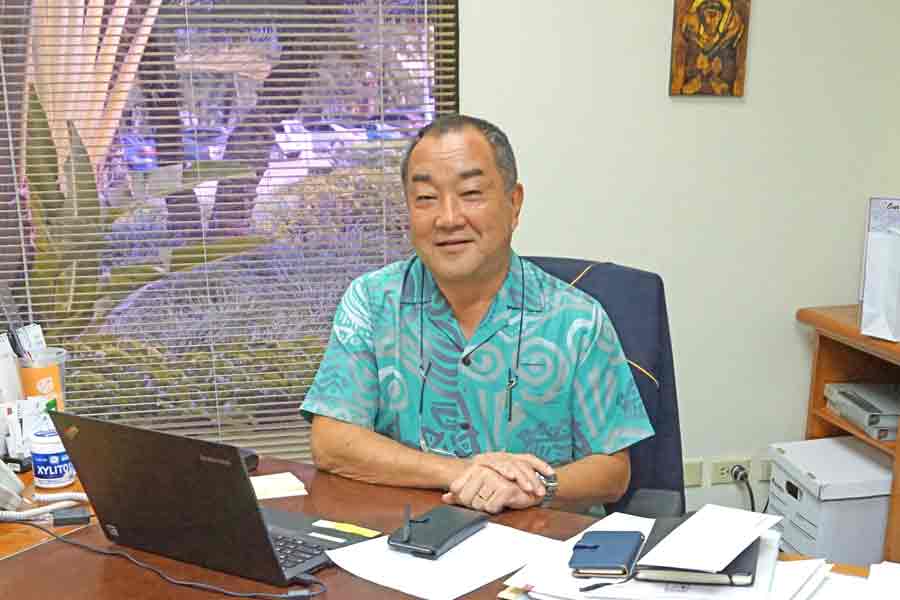Hyatt Regency Saipan celebrates 37 years in the CNMI
Competition is quite heavy as many places in Southeast Asia are also favored by many tourists. Everybody is trying to get their market share. What sets us apart, though, is that Saipan is a U.S. territory and we have so much to offer. Our tourists are a mix of new and repeating visitors.

Hyatt Regency Saipan general manager Nick Nishikawa. (Bea Cabrera)
Nick Nishikawa has been running the Hyatt Regency Saipan as general manager for 10 years now—a decade that has proven to be both challenging and fulfilling.
As the first international hotel brand in the CNMI, Hyatt is used to the ups and downs of a tourism economy but Nishikawa’s experience in the CNMI was sobering. Tourism was at a standstill as many flights were terminated.
There was only one flight from Korea and not a single flight from China.
“When I came to Saipan in 2008, the challenge was high because the economy was down. The management of Hyatt told to me that the economy was down to the bottom so go there to manage, raise, and lift up the hotel,” said Nishikawa in a chat with Saipan Tribune. “We were running 40- to 50-percent occupancy. To keep up, we closed the restaurant two days a week. At that time, we operated 36 hours a week,” he said.
Other establishments and even the CNMI government were operating at 32-36 hours per week.
“We slowly recovered in 2009. As the Japan and Korea tourists were low in numbers, we looked at the China market. The Hotel Association of the Northern Marianas Island, of which Hyatt is a member of, went to Shanghai and that was the beginning of a new tourism window.”
In 2012, with the China market growing, Hyatt Regency Saipan allocated rooms for Chinese tour agents to sell. That made the Chinese market a consistent source for the CNMI’s booming tourism. Other industries also caught fire, like Century Tours, charter flights of Star Marianas, and China Airlines had flight service from various cities in China.
Nowadays, most hotels in the CNMI are running at 100-percent accommodation. Nishikawa said the CNMI currently has 3,000 rooms to accommodate tourists and it is healthy.
In September 2017, HANMI reported an 89.83-percent average occupancy rate among 11 member-hotels for September 2017. The figure reflects a 5-percent increase compared to September 2016.
“Flights play a key role in bringing in tourists,” Nishikawa said.
He acknowledged, though, that the promotion being exhausted by Saipan Regency Saipan, HANMI, and the Marianas Visitors Authority to promote the Commonwealth in overseas markets has been very effective.
“Competition is quite heavy as many places in Southeast Asia are also favored by many tourists. Everybody is trying to get their market share,” he said. “What sets us apart, though, is that Saipan is a U.S. territory and we have so much to offer. Our tourists are a mix of new and repeating visitors.”
One of the biggest challenges that Hyatt Regency Saipan is dealing with is the eventual expiration of the CW-1 program in 2019.
“The number of hotels and tourists are increasing but the number of workers is not. In the hotel business, we need people and not machines. Machines you can buy but you cannot buy people.”
“Also, the number of resident workers is limited. If there were many, we would hire and train them but the number of people is limited. That’s why the CW workers cover the gaps and we worry about this area.”
Nishikawa said that Hyatt currently has 300 staff composed of 80 percent local residents and 20 percent CW-1 workers.
“When I came in 2008, the mix was 50-50. We are slowly getting into the transition, anticipating 2019, but to maintain the economy fueled by the tourism industry, the need for CW will always be there,” he said.
At the same time, Hyatt is awaiting the Legislature’s decision on Senate Bill 20-35, which would extend the lease of hotel establishments on public lands.
“The bill is in the House now and we are hoping for the extension. Many will be affected—300 employees and 1,000 family members if this doesn’t push through. We are currently updating our rooms and to get the lease extension would be good for our guests,” Nishikawa said.
“Tourism is the only industry on this island. If there are no hotels, there will be no tourism. Everyone will be affected and having hotels here definitely benefit the CNMI people,” he added.
This year is a milestone for Hyatt Regency Saipan, which would celebrate 37 years of being in the Commonwealth. If there is one legacy that Hyatt wants to be known for is that they value commitment.
“Once we open the door we cannot close it. The hotel business is open 24/7. When the economy was down, we survived but Hyatt knows how to survive. Experience plays a big role in that as Hyatt has been managing more than 600 hotels all over the world.”
“We learn how to survive on a good day and especially on bad days because of our commitment to our guests and the people of the CNMI,” Nishikawa said.
Hyatt Regency Saipan’s 37th anniversary will be highlighted by the lighting of the Christmas tree at the hotel’s lobby on Dec. 1 and the public is invited to join them.
“This celebration is really about giving thanks to our guests and the public who have supported Hyatt Regency Saipan all these years,” Nishikawa said. (Bea Cabrera)



























